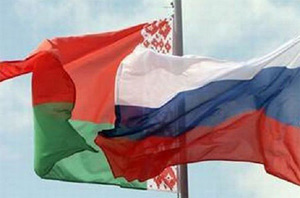
Belarusians in the Russian Federation Increasingly Nationalistic
Publication: Eurasia Daily Monitor Volume: 10 Issue: 216
By:

Many Russian and Western analysts have assumed that Belarusians and Russians are so similar ethnically that the nearly 1 million Belarusians living in the Russian Federation will inevitably identify with the larger nation and assimilate into it. But in fact, most are retaining their Belarusian identity even if they take Russian citizenship, a testament to both the strength of that identity and the weakening of the assimilatory powers of the Russian nation. Moreover, to the surprise of many and the concern of others, a growing number of them are becoming more nationalistic than their counterparts in Belarus itself, a reflection of both Belarusian-Russian friction and of the nature of President Alyaksandr Lukashenka’s regime.
Those are just some of the conclusions suggested by a new 10,000-word and heavily footnoted article by Nikolay Sergeyev on “The Belorussian Diaspora and the Russian World” (materik.ru/rubric/detail.php?ID=17181). The Moscow analyst devotes most of his attention to the Soviet period. But he argues that it is appropriate to call “practically all those born in Belarus who are living beyond the borders of the Republic of Belarus” a “diaspora,” including guest workers, students, and others who have chosen to resettle abroad—even those residing in the Russian Federation, which makes up the Union State with Belarus. And he suggests that Moscow and Minsk should be promoting the integration of Belarusians abroad into the Russian nation rather than assuming that such inclusion is so natural that it will take place on its own.
As Sergeyev points out, at one level, it looks like Belarusians living in the Russian Federation are choosing to identify as ethnic Russians. Prior to the collapse of the Soviet Union, the number of Belarusians in the Russian Soviet Federated Socialist Republic (RSFSR) numbered 1.1 million in 1991, while according to the 2010 census, only 521,000 remain today. But much of that apparent decline reflected factors other than ethnic re-identification. Among these other factors he listed the age structure of the Belarusian population in Russia, the return of perhaps 200,000 Belarusians to Belarus, and the equation of citizenship or residence with nationality.
“In post-Soviet Russian,” he says, those coming from Belarus “for the first time after 1919 could freely define their national membership.” About a third of them changed their identity from Belarusian to Russian. But in doing so, Sergeyev says, “they were not breaking from their Belarusian roots” but rather “returning” to “the bosom of the Russian people.” Nonetheless, Sergeyev’s article suggests that even if this claim is true—and that is far from certain given the problems with Russian censuses and their coding—many Belarusians living in the Russian Federation now are more attached to their Belarusian identity than ever before and are even best described as nationalistic.
As he points out, the Belarusians of the Russian Federation have a Federal National Cultural Autonomy which unites more than 20 regional Belarusian autonomies, approximately 80 Belarusian organizations and “more than 100 Belarusian creative collectives, which function in 23 regions of the Russian Federation.” Most of these groups, Sergeyev says, promote Belarusian cultural goals and cooperation with Russia. Yet, Russian tolerance has also allowed some Belarusian groups of “a national democratic type, which deny that Belarusians belong to the Russian world,” the opportunity to function openly.
Among these, Sergeyev says, are the Moscow Skobina Society of Belarusian Culture, the Hramada Society in Moscow, the Belarusian Social-Cultural Union of St. Petersburg, and the Irkutsk Society of Belarusian Culture. These groups promote “anti-Russian” values, and the head of the Irkutsk group, which has some 8,000 members, has even demanded that Minsk “deprive the Russian language of its status as a state language” in Belarus. Russian officials have investigated the group for extremism and allegedly found pro-Nazi publications and the white-red-white flag of Belarus (1991–1995) in the possession of its membership. What is especially disturbing, the Moscow writer continues, is that the leader of the Irkutsk group has been decorated by Lukashenka himself.
The Russian writer also criticizes Valery Kazakov, the president of the federation of Belarusian autonomies in the Russian Federation, for his support of Belarusian identity and those who promote it. Kazakov’s stance only keeps members of the two peoples (Russians and Belarusians) apart, Sergeyev says, and acts as a brake on “the reunification” of the two nations. At the same time, Kazakov’s views give “hope to opponents of all-Russian unity that they will be able to realize their destructive plans.” After all, Sergeyev suggests, in almost all countries, Belarusians finding themselves abroad “as a rule” find a place within “the Russian abroad and do not form any separate West Russian [sic—Belarusian] organizations.”
But then Sergeyev makes the startling confession: “Unfortunately, at the present time, responsible persons both in the Russian Federation and in the Republic of Belarus […] in most cases do not have a clear understanding of the fact that Belarus is an inalienable part of historical Rus and belongs to the Russian world.” Clearly, however, as Sergeyev unintentionally shows, many Belarusians, even those living in the Russian Federation, do not believe that.




